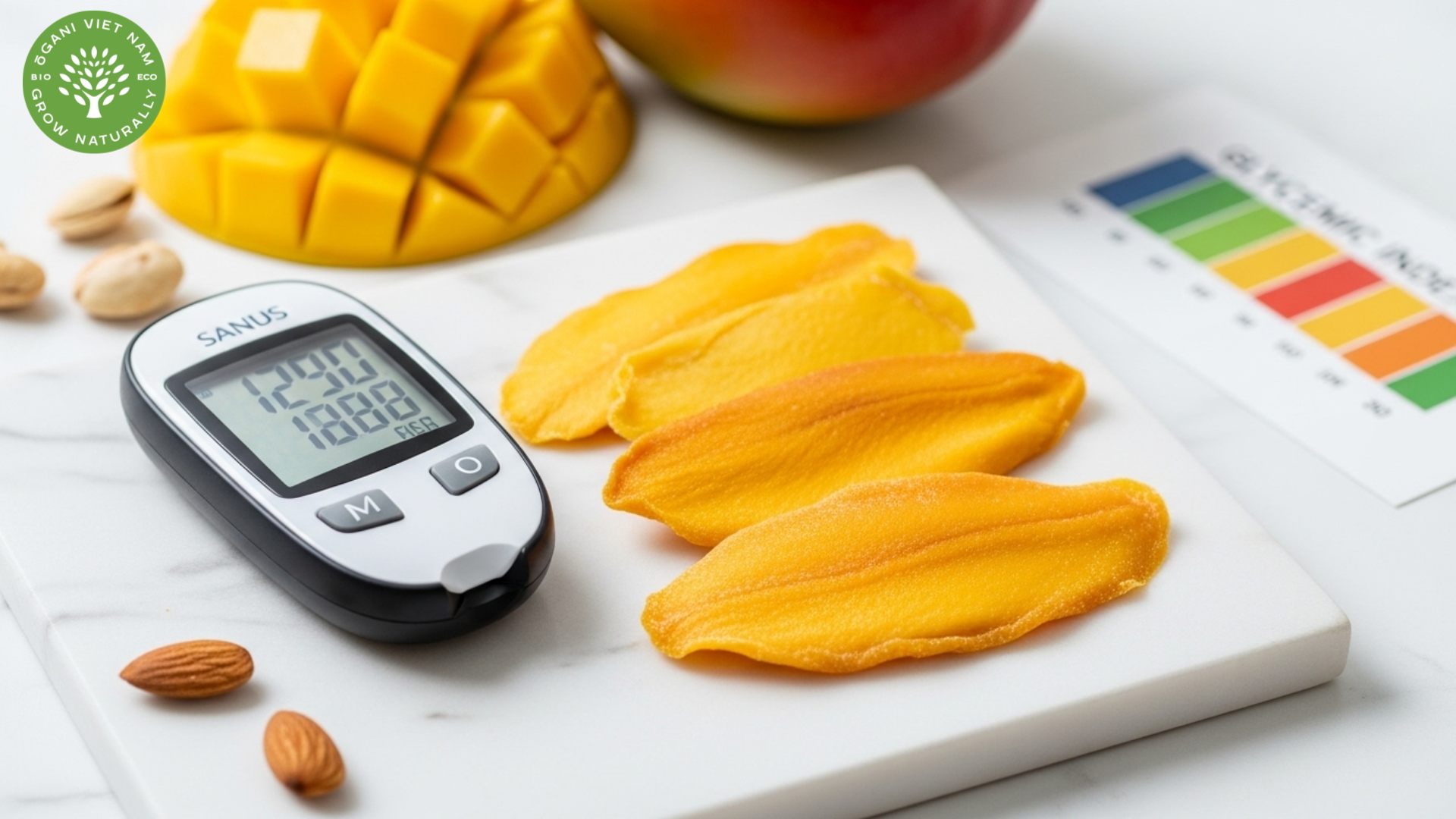
The glycemic index of dried mango ranges from 60-65, placing it in the medium to high GI category. This concentrated fruit snack can cause a more significant blood sugar spike compared to fresh mango, which has a lower GI of around 51. Understanding the glycemic index of dried mango is essential for anyone monitoring blood sugar levels.
Understanding the glycemic index of dried mango
When we at Ogani VN discuss dried fruit nutrition, understanding glycemic values becomes crucial for making informed dietary choices. The glycemic index of dried mango differs significantly from its fresh counterpart due to the dehydration process that concentrates natural sugars.
Fresh mango typically scores 51 on the glycemic index scale, earning it a low to moderate GI rating. However, the drying process removes water content while preserving most of the fruit’s natural sugars, resulting in a higher concentration of carbohydrates per serving. This concentration effect pushes dried mango’s GI score to approximately 60-65, depending on processing methods and added sugars.
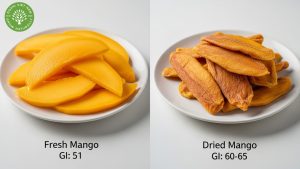
The glycemic load also plays an important role in blood sugar response. While a small portion of dried mango may have a moderate impact, larger servings can create substantial blood glucose elevation due to the concentrated sugar content.
How dried mango affects blood sugar levels
The impact of dried mango on blood glucose differs markedly from fresh fruit consumption. Research comparing fresh versus dried mango consumption shows that fresh mango promotes better satiety and more efficient postprandial glucose management.
When you consume dried mango, the concentrated fructose and glucose enter your bloodstream more rapidly than fresh fruit. The removal of water during processing means you’re consuming more fruit sugars in a smaller volume, leading to faster absorption and higher blood sugar peaks.
Studies indicate that dried mango consumption can significantly affect glucose levels compared to white bread, though the response varies among individuals. People with diabetes or prediabetes should monitor their blood sugar carefully when incorporating dried mango into their diet.
The fiber content in dried mango, while reduced compared to fresh fruit, still provides some benefit in slowing sugar absorption. However, this protective effect is diminished compared to whole fresh fruit.
Comparing dried mango to other dried fruits
Understanding where dried mango sits among other dried fruits helps contextualize its glycemic impact. Here’s how it compares to common dried fruit options:
| Dried Fruit | Glycemic Index | Classification |
|---|---|---|
| Dried Mango | 60-65 | Medium-High |
| Dried Apricots | 30-32 | Low |
| Prunes | 29 | Low |
| Raisins | 54-66 | Medium |
| Dates | 62 | Medium-High |
| Dried Figs | 61 | Medium-High |
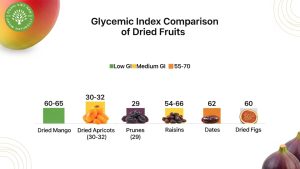
Dried apricots and prunes offer lower glycemic alternatives for those seeking dried fruit options with minimal blood sugar impact. These choices provide sweetness and nutrients while maintaining better glycemic control.
Raisins present similar concerns to dried mango, with their concentrated grape sugars creating moderate blood sugar responses. Dates and dried figs fall into comparable ranges, making portion control essential for blood sugar management.
Health considerations for diabetics and blood sugar management
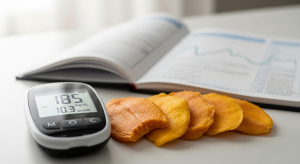
For individuals managing diabetes or monitoring blood glucose, dried mango requires careful consideration. The medium to high glycemic index means this snack can cause significant blood sugar elevation if consumed without proper planning.
Portion control strategies
We recommend limiting dried mango to small portions – typically 1-2 pieces or about 15-20 grams per serving. This amount provides the tropical flavor and some nutritional benefits while minimizing blood sugar impact.
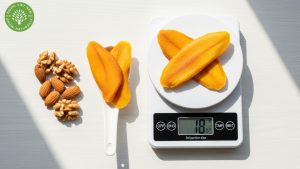
Pairing dried mango with protein or healthy fats can help slow absorption and reduce glycemic response. Consider combining small amounts with nuts, seeds, or Greek yogurt to create a more balanced snack.
Timing considerations
Consuming dried mango after meals or during physical activity may help mitigate blood sugar spikes. The existing food in your digestive system can slow absorption, while exercise helps muscles utilize glucose more efficiently.
Alternative options
For those who love mango flavor but need lower glycemic options, fresh mango in controlled portions offers better blood sugar management. Freeze-dried mango may also provide a lower glycemic alternative, though specific studies are limited.
Nutritional benefits beyond glycemic impact
Despite its higher glycemic index of dried mango, this concentrated fruit offers several nutritional advantages when consumed mindfully. The concentration process preserves many vitamins and minerals while creating a shelf-stable snack option.
Dried mango provides significant vitamin C content, supporting immune function and collagen synthesis. The beta-carotene content converts to vitamin A in your body, promoting eye health and immune system function.
The natural antioxidants in mango, including mangiferin and other polyphenols, remain present in dried form. These compounds offer anti-inflammatory properties and may support cardiovascular health when consumed as part of a balanced diet.
Fiber content, though reduced from fresh fruit, still contributes to digestive health and may help moderate the glycemic response slightly. The potassium content supports heart health and proper muscle function.
However, the caloric density increases dramatically during drying. Where fresh mango provides about 60 calories per 100 grams, dried mango can contain 300+ calories in the same weight, making portion awareness crucial for weight management.
Frequently Asked Questions
Q: Can diabetics eat dried mango safely? A: Diabetics can include small portions of dried mango occasionally, but should monitor blood sugar closely and consult healthcare providers about incorporating foods with the glycemic index of dried mango into their meal plans.
Q: How much dried mango is considered a safe serving? A: A safe serving is typically 1-2 pieces (15-20 grams) to minimize blood sugar impact while providing some nutritional benefits, considering the glycemic index of dried mango.
Q: Is unsweetened dried mango better than sweetened versions? A: Yes, unsweetened dried mango has a lower glycemic impact than versions with added sugars, though both maintain the basic glycemic index of dried mango range and should be consumed in moderation.
Q: What’s the difference between dried mango and mango chips? A: Mango chips are often fried or have added oils, potentially increasing calories and changing the glycemic response compared to air-dried mango and the standard glycemic index of dried mango.
Q: Can I eat dried mango during weight loss? A: Dried mango can fit into weight loss plans with careful portion control, but fresh mango typically offers better satiety and lower calorie density than foods with the glycemic index of dried mango.
Making informed choices with dried mango in your diet
The glycemic index of dried mango places it in the medium-high category, requiring mindful consumption for optimal blood sugar management. While this tropical treat offers valuable nutrients and satisfying sweetness, understanding the glycemic index of dried mango helps you make informed dietary choices.
At Ogani VN, we believe in enjoying nature’s bounty responsibly. If you’re managing blood sugar levels or following a specific dietary plan, consider our fresh organic mangoes as a lower glycemic alternative, or enjoy dried mango in small, controlled portions as part of a balanced approach to nutrition. Remember, the glycemic index of dried mango should always be factored into your daily carbohydrate planning.
Ready to explore healthier fruit options? Browse our selection of fresh, organic tropical fruits that provide natural sweetness with better glycemic control for your wellness journey, offering alternatives to the higher glycemic index of dried mango.
Read more:
- Lycemic Index Of Dried Mango: Complete Blood Sugar Guide
- Best Dried Mango No Sugar Added: Premium Quality Guide
- Calories In Dried Mango No Sugar Added: Complete Nutrition Guide
- Are Dried Mangoes Good For You? The Complete Health Guide
- Dried Mango Calories: Complete Nutrition Guide & Healthy Snacking Tips

